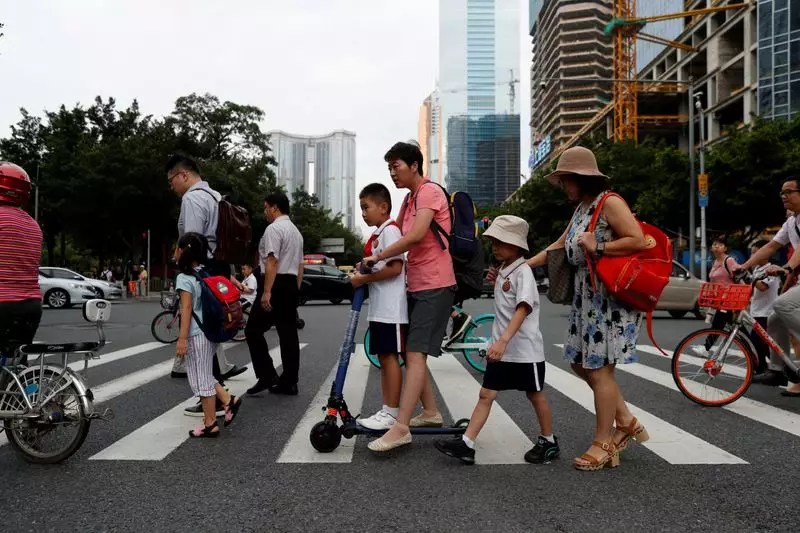In recent months, a subtle yet significant transformation is unfolding within China’s private tutoring sector. Despite the absence of formal declarations from government bodies, the signs are evident: policymakers are softening their stringent stance on private education as part of broader efforts to stabilize the economy following the unprecedented downturn prompted by the 2021 “double reduction” policy. Initially aimed at alleviating educational pressures on students and their families, this policy dealt a heavy blow to the exorbitantly valued tutoring market, which was estimated at around $100 billion before the crackdown. This article explores the evolving landscape of private tutoring in China, shedding light on the nuances of a regulatory environment that appears to be changing direction.
The aftermath of the 2021 crackdown disrupted the tutoring landscape significantly. Major players like New Oriental Education & Technology Group and TAL Education Group experienced steep declines, resulting in billions of dollars lost in market value and the elimination of tens of thousands of jobs. Despite this turmoil, demand for tutoring services remained robust, reflecting the insatiable appetite for educational support in a fiercely competitive and high-pressure academic environment. Parents like Michelle Lee have continued to invest heavily in these services, determined to equip their children with the tools necessary to excel amidst intense educational competition.
Lee’s experience illustrates a broader trend where parents, grappling with feelings of inadequacy in supporting their children’s educational needs, remain willing to spend substantial sums on tutoring services. As recent interviews reveal, many parents report a palpable shift in the environment of tutoring institutions, where previously cautious behaviors—like closing curtains during sessions—are being replaced with a more open approach to teaching. This signals a tentative return to regular service offerings and advertising, suggesting a possible reconciliation between regulatory expectations and the realities parents face.
Industry analysts and insiders suggest that the transition towards a more supportive regulatory setting is partially driven by the recognition of evolving economic challenges. With unemployment rates among recent university graduates soaring, the state appears to be realigning its focus towards job creation and economic revival through sectors like private education. Recent announcements, including an August directive including educational services in a broader, consumption-boosting initiative, further reinforce this pivot.
Consultancy experts contend that the Education Ministry’s previous rigid stance may not see a complete repudiation but rather an adjustment that maintains tight regulations while allowing for greater operational freedom. This nuanced policy shift signifies an acknowledgment that the private tutoring industry, despite earlier setbacks, is crucial for fostering both individual educational achievement and broader economic health.
As regulation becomes less prohibitive, tutoring companies are finding ways to adapt and redefine their services. Innovative strategies are emerging, allowing these businesses to thrive under the existing restrictions. For instance, many operators have reframed their course offerings to comply with new regulations—using euphemisms like “logical thinking” to refer to mathematics tutoring. Such creative adaptations highlight both the resilience of the sector and the challenges it faces in navigating government oversight.
Additionally, parent-led solutions are reshaping the tutoring experience, with many families seeking out more personalized, one-on-one tutoring in the comfort of home. However, this has created a dilemma. As the costs for private tutors can soar to 800 yuan per session, parents find themselves at a crossroads: either make significant financial investments in external tutoring or dedicate substantial amounts of their own time to support their children’s studies effectively.
As the private tutoring landscape gradually lifts itself from the shadows of stringent regulations, the implications for industry stakeholders and families are far-reaching. While the sector may not return to its pre-crackdown glory, its ability to adapt and flourish indicates a resilience that could shape its future trajectory. Educational firms are actively hiring, as seen in the reported increases in active licenses for extracurricular programs. This re-emergence is heartening for an industry that has long been entangled in bureaucratic restrictions.
While parents remain cautious, their ongoing quest for quality educational support signals a renewed sense of hope for the private tutoring industry in China. Continuous monitoring of the regulatory environment will be essential, as both the government and educational institutions strive to find equilibrium between the demands of an evolving economy and the competitive nature of education. Ultimately, the revival of the private tutoring sector speaks to a fundamental desire for growth and the unyielding pursuit of academic excellence in a rapidly changing world.


Leave a Reply